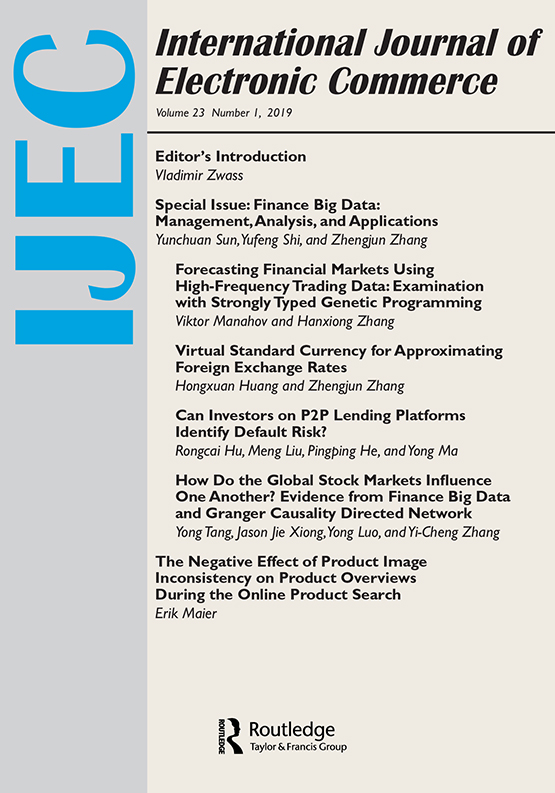Cooperation Mode Selection and Information Sharing in a Fresh Produce Supply Chain With Freshness-Keeping Effort
IF 3.8
3区 管理学
Q2 BUSINESS
International Journal of Electronic Commerce
Pub Date : 2023-04-03
DOI:10.1080/10864415.2023.2184241
引用次数: 2
Abstract
ABSTRACT This article considers a fresh produce supply chain where the supplier provides freshness-keeping effort and the e-commerce platform owns private demand information. The supplier can choose to cooperate with the platform in reselling or agency selling mode, and the platform can choose whether to share information. Considering that demand is affected mainly by freshness and price, we model a multistage game and explore the supplier’s cooperation mode choice and the platform’s information sharing strategy. We reveal that the supplier should consider scale economics while investing in freshness-keeping resources. The platform should be cautious in setting the commission fee because she does not always benefit from the increased commission rate. We also show that the platform may benefit or suffer from information sharing, depending on the freshness sensitivity and the cooperation mode choice. As information sharing benefits responsive decision making, we reveal that the supplier may choose agency selling to induce information sharing even at a high commission rate. We also find that the interaction between cooperation mode selection and information sharing may lead to a win–win or lose–lose equilibrium strategy. Specifically, the supplier and the platform may achieve win–win cooperation under agency selling (reselling) at a low (high) commission rate. Then, to improve supply-chain performance, we design incentive contracts to motivate information sharing and adjust the cooperation mode choice. After the strategy adjustment, we find that the supplier may adopt a strategy of high quality with a low price under agency selling.保鲜型生鲜产品供应链的合作模式选择与信息共享
摘要本文考虑了一个新鲜农产品供应链,其中供应商提供保鲜工作,电子商务平台拥有私人需求信息。供应商可以选择以转售或代理销售模式与平台合作,平台可以选择是否共享信息。考虑到需求主要受新鲜度和价格的影响,我们建立了一个多阶段博弈模型,探讨了供应商的合作模式选择和平台的信息共享策略。我们发现,供应商在投资保鲜资源时应考虑规模经济。平台在设定佣金时应该谨慎,因为她并不总是从提高的佣金率中受益。我们还表明,根据新鲜感的敏感性和合作模式的选择,平台可能会从信息共享中受益或受损。由于信息共享有利于响应性决策,我们发现,即使佣金率很高,供应商也可能选择代理销售来诱导信息共享。我们还发现,合作模式选择和信息共享之间的互动可能导致双赢或双输的均衡策略。具体而言,供应商和平台可以在低(高)佣金率的代理销售(转售)下实现双赢合作。然后,为了提高供应链绩效,我们设计了激励契约来激励信息共享,并调整了合作模式的选择。经过策略调整,我们发现供应商在代理销售的情况下可能会采取物美价廉的策略。
本文章由计算机程序翻译,如有差异,请以英文原文为准。
求助全文
约1分钟内获得全文
求助全文
来源期刊

International Journal of Electronic Commerce
工程技术-计算机:软件工程
CiteScore
7.20
自引率
16.00%
发文量
18
审稿时长
>12 weeks
期刊介绍:
The International Journal of Electronic Commerce is the leading refereed quarterly devoted to advancing the understanding and practice of electronic commerce. It serves the needs of researchers as well as practitioners and executives involved in electronic commerce. The Journal aims to offer an integrated view of the field by presenting approaches of multiple disciplines.
Electronic commerce is the sharing of business information, maintaining business relationships, and conducting business transactions by digital means over telecommunications networks. The Journal accepts empirical and interpretive submissions that make a significant novel contribution to this field.
 求助内容:
求助内容: 应助结果提醒方式:
应助结果提醒方式:


